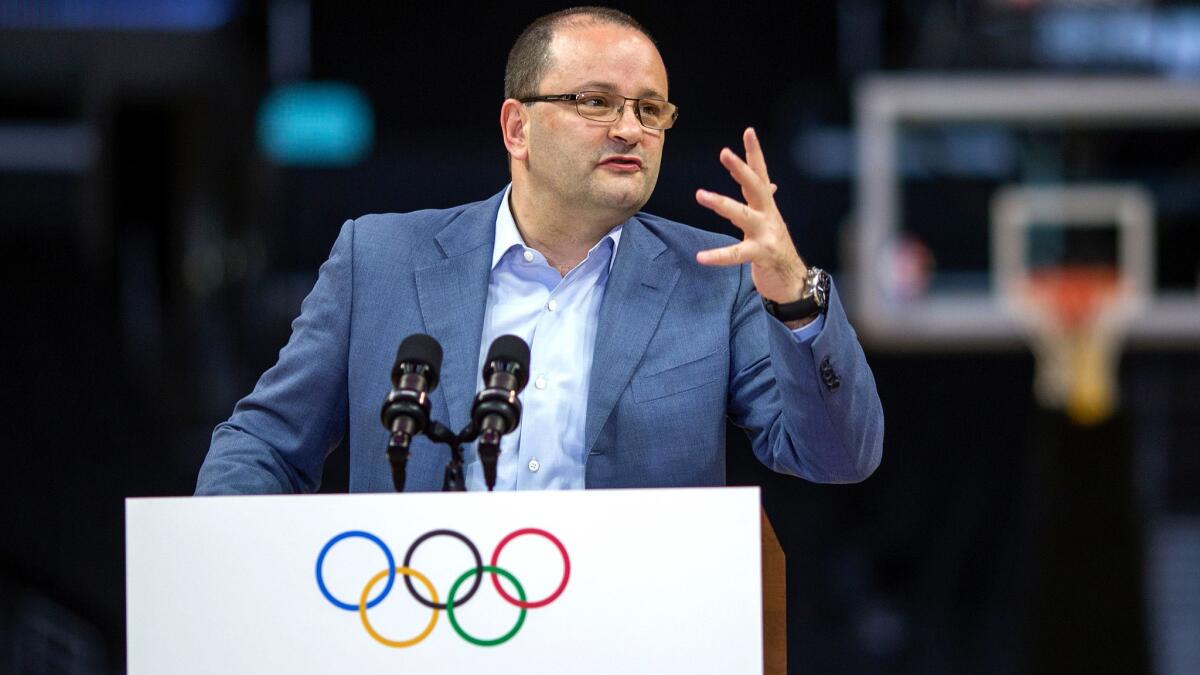LA 2024 officials think they impressed IOC evaluators but know there is more work to be done

The smiles on their faces made it obvious.
As leaders of Los Angeles’ bid for the 2024 Summer Games, Mayor Eric Garcetti and sports executive Casey Wasserman clearly believed they had made a good impression on visiting Olympic officials over the previous few days.
“This has been an immensely productive week,” Garcetti said. “It really surpassed my expectations.”
But as the International Olympic Committee’s evaluation commission concluded its fact-finding mission in Southern California on Friday — departing for Paris, the other candidate in the race — LA 2024 officials acknowledged there is more work ahead.
A crucial presentation is scheduled for mid-July at IOC headquarters in Switzerland. Just as important, bid leaders expect to enter confidential negotiations that could radically alter the competition.
The talks will focus on a potential “two-winner” arrangement by which the IOC might give 2024 to one city and 2028 to the other.
The candidate that agrees to wait four years might be able to wrangle a larger slice of Olympic revenues — perhaps hundreds of thousands of dollars — and demand other concessions.
“I think any city would have to look at the terms, if the rules change, of what a 2028 award means,” Garcetti said. “Our committee will look at that at any given time.”
IOC evaluators were not as keen to discuss the issue when they faced questions from reporters inside Staples Center.
“We are in the middle of a process that started 18 months ago and started with a very clear mandate,” commission chairman Patrick Baumann said. “That is … to make a report for an award of the 2024 host city.”
The IOC has assigned its four vice presidents to study the 2028 option along with other potential bidding changes. The working group is not expected to report back until next month.
“We have to wait for whatever recommendation it is,” Baumann said.
At this point, L.A. and Paris appear to be running neck and neck.
After its visit to France next week, the evaluation commission will prepare a detailed assessment for the 100 or so voting members who are scheduled to make a selection in September.
Baumann and his colleagues — 11 evaluators plus accompanying staff — gave LA 2024 reason to smile after holding meetings on Wednesday, touring proposed venues such as Pauley Pavilion and the Coliseum on Thursday, then conducting a brief Friday review.
“The commission members were, I would say, almost ecstatic about the level of venues they have found and they have seen,” Baumann told the media, adding: “In L.A., there is no major risk that we can highlight.”
The bid received high marks for proposing a $5.3-billion budget that avoids construction costs by relying on existing stadiums and arenas. The decision to use UCLA as an athletes village, saving $1 billion or more, was also well-received.
“Los Angeles is already a great Olympic city,” Baumann said, referring to the 1932 and 1984 Summer Games that took place in Southern California. “The Olympic spirit is incredibly strong in this city.”
Yet Paris has mounted a persuasive bid that makes use of iconic locations such as the Eiffel Tower and Palace of Versailles. The French have failed in recent bids, but the IOC tends to reward candidates that keep trying.
One more thing — the City of Light might be a sentimental favorite because 2024 would mark the 100th anniversary since it last hosted the Games in 1924.
That could explain why Garcetti said: “I never am overconfident.”
LA 2024 has faced other challenges, including the Trump presidency.
With IOC members in some parts of the world expressing concern about President Trump’s position on issues such as immigration and foreign trade, bid leaders have been forced to talk constantly about diversity and inclusiveness.
On Friday, Garcetti said he has spoken with Mexican officials about the possibility of holding some 2024 events — such as qualifying soccer games — across the border.
At the same time, the mayor suggested Trump might be active in the bid moving forward. That could mean a White House meeting with IOC President Thomas Bach or even an appearance at the September vote in Lima, Peru.
“I think the President is willing to play whatever role that we ask and that is needed,” Garcetti said. “He was clear with me about that when we talked about that in December.”
Politics never entered into the discussions this week, Baumann said briefly. The IOC official preferred to talk about his organization emerging from a period when potential hosts had withdrawn their bids because of cost concerns.
“We are in a very fortunate moment in time, in the history of bids for the Olympic Games, in the sense that we have two excellent cities,” he said.
That is why IOC members might select both, hoping to avoid further bid drama over the next decade or so. They broached the subject with bid leaders at a sports convention in Denmark in April.
“I assume they’re going through that process,” Wasserman said of the working group. “I would expect sometime later in May or early June would be the time they would be able to come back to us.”
For LA 2024 leaders, that’s when the real work begins.
Follow @LAtimesWharton on Twitter
More to Read
Go beyond the scoreboard
Get the latest on L.A.'s teams in the daily Sports Report newsletter.
You may occasionally receive promotional content from the Los Angeles Times.







